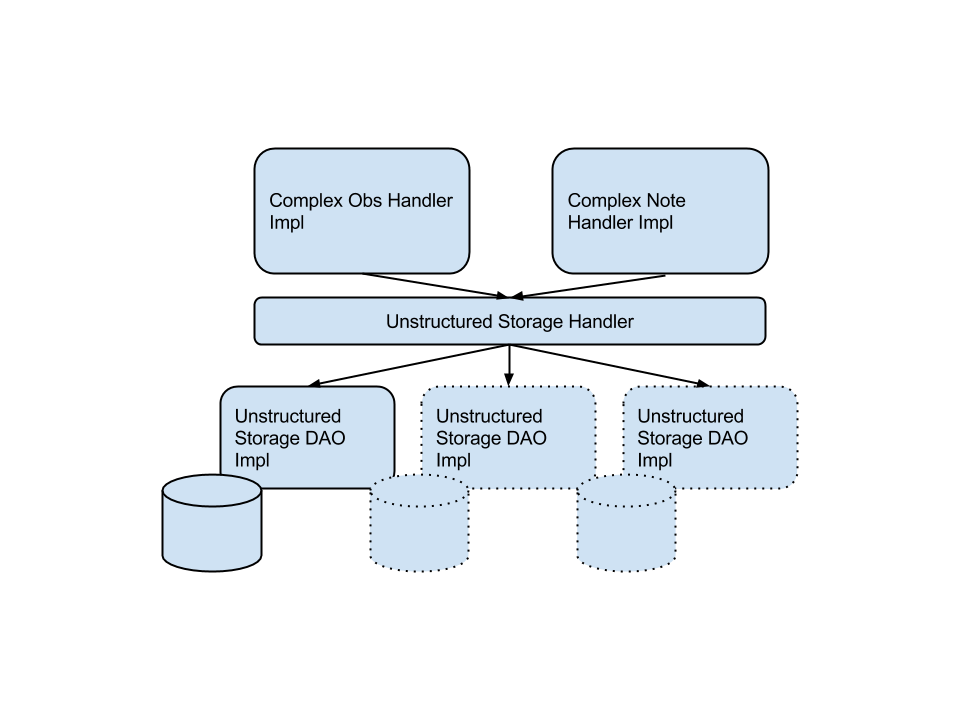This module will contain a Complex Observation Handler used to store unstructured data in the form of a complex observation to any storage systems suited for the purpose. The handler will be able to select a storage DAO according to the MIME type of the data that it's passed. So, for instance, a serialized object can be saved to a NoSQL database and large binary data can be saved to a distributed file/storage system.
It should be noted that there is no such thing in OpenMRS-core as a Complex Note as yet. We propose to get a ComplexData field included in the Note object and for the core to provide a ComplexNoteHandler interface. Any note with a non-null ComplexData property will be handled by a ComplexNoteHandler implementation.
Design
Implementing the ComplexObsHandler (and ComplexNoteHandler in the future)
package org.openmrs.module.shr.unstructureddata.obs.handler;
import java.io.IOException;
import org.openmrs.Obs;
import org.openmrs.api.APIException;
import org.openmrs.api.context.Context;
import org.openmrs.module.shr.unstructureddata.dao.handler.UnstructuredDAOHandler;
import org.openmrs.module.shr.unstructureddata.dao.handler.UnstructuredDAOService;
import org.openmrs.obs.ComplexData;
import org.openmrs.obs.ComplexObsHandler;
import org.openmrs.obs.handler.AbstractHandler;
public class UnstructuredDataHandler extends AbstractHandler implements ComplexObsHandler {
@Override
public Obs saveObs(Obs obs) throws APIException {
String contentType = getContentType(obs.getComplexData().getTitle());
String key = obs.getUuid();
if (Context.getService(UnstructuredDAOService.class).getUnstructuredDAO(contentType).saveObject(key, obs.getComplexData().getData())){
obs.setComplexData(null);
obs.setValueComplex(obs.getComplexData().getTitle());
} else {
throw new IOException();
}
return obs;
}
@Override
public boolean purgeComplexData(Obs obs) {
String contentType = getContentType(obs.getComplexData().getTitle());
String key = obs.getUuid();
return Context.getService(UnstructuredDAOService.class).getUnstructuredDAO(contentType).purgeObject(key);
}
@Override
public Obs getObs(Obs obs, String view) {
String contentType = getContentType(obs.getComplexData().getTitle());
String key = obs.getUuid();
ComplexData complexData = new ComplexData(obs.getComplexData().getTitle(), Context.getService(UnstructuredDAOService.class).getUnstructuredDAO(contentType).getObject(key));
obs.setComplexData(complexData);
return obs;
}
String getContentType(String title){
return null;
//do parsing here
}
}
Service
package org.openmrs.module.shr.unstructureddata.api;
import org.openmrs.api.OpenmrsService;
import org.openmrs.module.shr.unstructureddata.dao.UnstructuredDAO;
import org.openmrs.module.shr.unstructureddata.exception.AlreadyRegisteredException;
public interface UnstructuredDAOService extends OpenmrsService {
/** To be called by the ComplexObsHandler/ComplexNoteHandler */
UnstructuredDAO getUnstructuredDAO(String contentType);
/** For each DAO a call to this method will be added in the ModuleActivator willStart() method */
void RegisterUnstructuredDAO (String contentType, UnstructuredDAO prototype) throws AlreadyRegisteredException;
/** For each DAO a call to this method will be added in the ModuleActivator willStop() method */
void DeregisterUnstructuredDAO(String contentType);
}
Interfaces
package org.openmrs.module.shr.unstructureddata.dao;
public interface UnstructuredDAO {
Boolean saveObject(String key, Object value);
Object getObject(String key);
Boolean purgeObject(String key);
}
Possible Database / File Storage Options
As we suspect we'll be storing a lot of XML documents as blobs, a native XML database that supports XPath and XQuery is something we could be looking at.
BaseX seems to be the open-source XML database with the most freely available features.
For binary data storage a distributed file system seems like it will provide the best redundancy and scalabiltiy. RiakCS is a cloud storage platform that uses the Amazon S3 API and the Riak cluster module to provide high-availability storage. OpenStack Swift and Hadoop HDFS are other options to look at.
